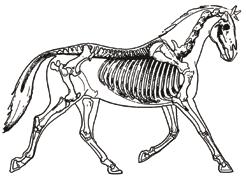
9 minute read
EVP Interview with Colleague Chris Riley
EVP INTERVIEW WITH COLLEAGUE
CHRIS RILEY
Professor of Equine Clinical Studies, Massey University C.B.Riley@massey.ac.nz
What is your practice area, and how many years have you been doing this?
My current practice is academic, focused mostly on research with some teaching and clinical service in equine surgery, and promotion of external stakeholder engagement for the University. Almost 34 years since graduating (hard for me to believe!) work has included stints in private practice in Australia, USA, and Canada.
Before coming to New Zealand, I spent about 70% of my time in North America doing referral work and about 30% doing research and non-clinical teaching.
Where did you obtain your veterinary degree, and did you take on any post-graduate studies?
I obtained my vet degree at the University of Melbourne, after a degree in physics while in the Royal Australian
Airforce. After an internship at Murdoch University, I completed a residency in Large Animal Surgery, MSc and PhD at the University of Saskatchewan, Canada.
I qualified as a specialist in veterinary surgery the following year while working at Iowa State University.
About 10 years later I completed a business qualification in Innovation Management at the Melbourne Business
School.
Why did you choose this area of practice?
During the last year of my vet degree, and during my internship I became more and more interested in the challenges of doing surgery on these large and complex animals. I enjoyed the mixture of intellectual challenge and technical requirements with the very real physical challenges of doing large animal surgery. Thinking calmly on your feet has always appealed to me.
Any bumps and hurdles along the way to get here?
Yes. I had to work throughout my vet programme to pay my fees and living expenses. I didn’t get much sleep, but
I graduated owing only $2000. Getting into the residency program in North America was extremely competitive and required adaptation to a system very different to the one I was used to. Once again, not much sleep, but I came out at the end with qualifications that have opened many interesting doorways since. About 21 years out I came close to quitting the profession as I was feeling unfulfilled professionally. This changed for the better after
I accepted a position as a large animal surgeon at the
Atlantic Veterinary College in Canada where I worked for 11 years.
Outline the data and knowledge sources that are most useful to staying current in your areas of practice.
Having Google and ResearchGate profiles are helpful in providing me with regular alerts about articles in my interest areas. I also review many articles for journals which requires me to keep up with new developments.
Being open to learning about veterinary practice on other species and in other fields helps me to sustain my professional creativity and curiosity.
What do you like most about your work?
Difficult to choose. I greatly enjoy teaching surgery and ensuring our students have strong foundational skills that will sustain a lifelong career. I still find it inspiring to work with our future colleagues and to see them succeed at university and after graduation. Research plays a big part in my career satisfaction, as I still enjoy the challenges of discovery and collaboration, trying to answer questions of interest to New Zealand and globally, and sharing what has been discovered with our profession and the public.
What is the most challenging part of your job?
Working in a large complex organisation with many different demands, particularly during times of rapid and far-ranging changes. Like most academics this tends to pull me in several different directions, requiring me to balance my veterinary professional roles with many others in the University.
What advice would you give to someone thinking of following your line of practice?
If creativity and curiosity are part of what drives you, an academic environment allows you to explore new ideas and collaborations, and to meet interesting people within and outside of our profession. Pursue your veterinary professional passions. Seek out those who are supportive and encouraging of your professional ambitions, and minimise the time spent with those that are negative and discouraging. Do not only think about how your career path will benefit you, but how might your skills and experience benefit those around you, whether they be colleagues, clients, or the wider community. Build positive collegial relationships, prioritising time to listen to and acknowledge people.
Should our BVSc [Massey] programme include substantial species or discipline specialization, or should that be mainly left to post-graduate training periods?
I think there should be greater capacity within the BVSc programme for students to have some course electives in the earlier years of the programme, allowing them to develop a greater depth of skills/knowledge in species or disciplines of their interest. There’s been an increased breadth of skills development in accredited veterinary degrees worldwide, but this has been at the cost of depth.
Of course, there are different cost-benefit propositions for each programme option. Postgraduate training has its place, but there are relatively few equine opportunities in New Zealand, and there is limited standardisation in terms of quality of training and supervision for those that do exist.
What annoys you most about your current veterinary involvement?
I am certainly no saint, but I do try not to let myself get too worked up or negative about the challenges of our profession. I prefer to put my energies into what can be done without having unreasonable expectations about the speed with which change occurs. I guess like most veterinarians, I still don’t enjoy working for or with people that are negative, confrontational, or unreasonable, whether they be colleagues or clients.
What are your passions outside of work?
Boring I’m afraid. I do pottery and sculpture and have my own studio. I give a few classes every year and occasionally have an exhibition. I like the immersive and freeing experience of converting dirt into art or functional objects. We live close to the beach, and I enjoy heading there when I can, as well as caring for my family and small lifestyle property. I also enjoy learning about different cultures when travelling.
Share your best practice tip
Never drop or lose a thermometer again. Take a piece of strong non-absorbable suture material and attach it with adhesive tape to the end of your thermometer. Attach the other end to a small bulldog clip. This way you can put the thermometer in the rectum and clip it to the tail hairs while finishing your exam.
Give us a Tweet on Brexit, Trump, Putin… or anyone/thing else you like.
“Those that aspire to mediocrity are rarely disappointed”.
Per ardua ad Astra: motto of the Royal Australian Air
Force.
A FEW PERSONAL QUESTIONS
Sporting event/concert you travel back in time for:
seeing Bob Marley and the Wailers live
Last memorable meal:
Canadian lobster tails last year
Best-ever or best-tentative dinner party guests:
Professor Mohan De Silva MS, FRCS Edin, FCSSL is a retired human surgeon and educator whom I met while working in Sri Lanka. I was impressed and very moved by his humanity and heartfelt recollections of working with the severely injured in extremely difficult circumstances during the Sri Lankan civil war. A doctor, a singer, a cricketer, and a true Renaissance man.
First-ever concert:
Spandau Ballet – embarrassing?
Favourite ever album/band:
Dark Side of the Moon, Pink Floyd
Finish the sentence: no woman/man should ever wear… :
Spandex
Beer or wine/Stones or Beatles:
A good south Australian Cabernet; old style of course ~
Beatles.
What was the last lie you told?
I’ll be home from work soon …
Most interesting surgery you have done:
Bilateral artificial cruciate ligament insertions in a valuable
New Zealand Jersey cow.
Best self-defence tip:
Take a deep breath, let it out quietly and slowly, and relax your body. You will be able to move more quickly when the time comes.
Person(s) who influenced you most in your life:
My grandfather – an aboriginal man, veteran, tough horseman and breaker
Best life lesson/life motto:
Be patient, listen and be empathetic and kind
Final comments
Humbled by this invitation.
EVP EDUCATIONAL FUND

Dear Colleagues. Did you know that you are eligible to apply for EVP funds to assist you in obtaining equine veterinary experience, training, travel, CPD etc? This is an annual sum of money is set aside each year by the NZEVA EVP Editorial Group to establish a Continuing Education (CE) fund. These funds can be for use overseas or within Aotearoa. Possible uses of funds include attending the NZVA/NZEVA conference or short courses, spending time at specialist equine clinics and learning new skills from other (non-clinical) sources e.g., veterinary pathology laboratory. The two main purposes of this fund are: • facilitating continuing education and/or specialist training for all paid up NZVA members and EVP
Editorial Group members • disseminating information resulting from such funding that is of benefit to New Zealand equine practitioners through publication in the Equine
Veterinary Practitioner journal


Applicants seeking assistance from the CE fund must adhere to the following guidelines: 1. Present a complete budget for the proposed CE project and identify all sources of funds being sought and the planned use of any funds awarded from this fund. 2. Demonstrate that funds awarded under this scheme were used for the stated purpose. 3. Normally – CoViD permitting - present a verbal report to the NZEVA EVP Editorial Group at a convenient EVP meeting held after completion of the CE project, or at the next NZEVA Annual
Conference. 4. Within 60 days of the applicant completing, and/or returning to NZ from, the CE project, submit to the
Editor of the EVP a concise report of the project, identifying key new practical items of interest and value to NZ equine practitioners. 5. Applications can be made in writing to and will be assessed by two members of the EVP Editorial
Group [currently JM and BH], who are NOT eligible for funding. 6. The application must include a signed statement:
“I have read and understand my obligations to the EVP Editorial Committee.”
7. Approved applications can access up to 75% of awarded funds prior to undertaking the proposed travel. The remaining 25% will be paid upon receipt of an acceptable written report. 8. Except in exceptional cases, the amount awarded to any individual applicant will not exceed 50% of the available funds.

Applications to evp.editor@gmail.com, anytime. Liquid supplement containing Glucosamine, Chondroitin & Biotin suspended in Omega Oil for bone & joint health, mobility & hoof condition in horses.
Added nutrients per 30mls of oil (minimum):
Crude Fat 85% Omega 3 Vitamin A 4050 iu Biotin
2208 mg 4.9 mg Vitamin D 255 iu Niacin 5.6 mg Vitamin E 45 mg Calcium Pantothenate 6.2 mg Vitamin B1 1.05 mg Folic Acid 0.12 mg Vitamin B2 1.3 mg Selenium 0.1mg Vitamin B6 0.55 mg Glucosamine Sulphate 2010 mg Vitamin B12 13 µg Chondroitin Sulphate 501 mg Omega 6 3948 mg






